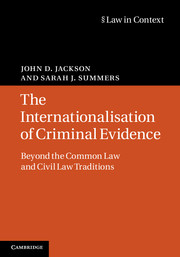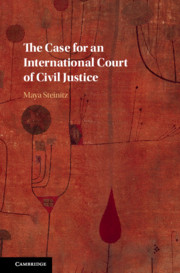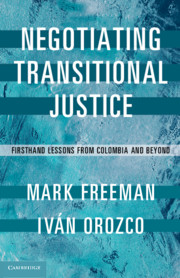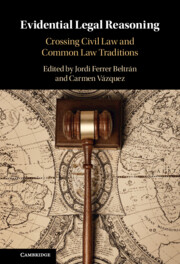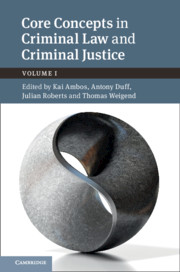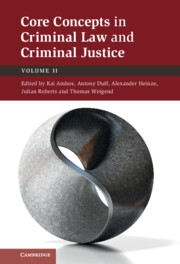The Internationalisation of Criminal Evidence
Beyond the Common Law and Civil Law Traditions
Part of Law in Context
- Authors:
- John D. Jackson, University College Dublin
- Sarah J. Summers, Rechtswissenschaftliches Institut, Universität Zürich
- Date Published: January 2012
- availability: Available
- format: Hardback
- isbn: 9781107018655
Hardback
Other available formats:
Paperback, eBook
Looking for an inspection copy?
Please email [email protected] to enquire about an inspection copy of this book
-
Although there are many texts on the law of evidence, surprisingly few are devoted specifically to the comparative and international aspects of the subject. The traditional view that the law of evidence belongs within the common law tradition has obscured the reality that a genuinely cosmopolitan law of evidence is being developed in criminal cases across the common law and civil law traditions. By considering the extent to which a coherent body of common evidentiary standards is being developed in both domestic and international jurisprudence, John Jackson and Sarah Summers chart this development with particular reference to the jurisprudence on the right to a fair trial that has emerged from the European Court of Human Rights and to the attempts in the new international criminal tribunals to fashion agreed approaches towards the regulation of evidence.
Read more- Proposes a new conception of the law of criminal evidence across different legal traditions that gives students and practitioners a fresh perspective on the topic
- Systematic analysis of the way in which international bodies and courts such as the European Court of Human Rights and the international criminal tribunals have been developing the law of criminal evidence provides students, practitioners and policymakers with a detailed knowledge and critique of the international jurisprudence on criminal evidence
- Examines the impact of international jurisprudence on the law of criminal evidence in both common law and civil systems, thus shedding light on the development of the law of criminal evidence across the common law/civil law divide
Reviews & endorsements
'The case made by Jackson and Summers for effective rights of defence participation before as well as at trial is compelling. In emphasising the common history and shared present of the civil and common law systems rather than their differences, this work provides a fresh and illuminating perspective from the opposite side of the glass. It is an extraordinarily rich and scholarly endeavour which constructs an ambitious thesis.' Laura Hoyano, Criminal Law Review
Customer reviews
Not yet reviewed
Be the first to review
Review was not posted due to profanity
×Product details
- Date Published: January 2012
- format: Hardback
- isbn: 9781107018655
- length: 442 pages
- dimensions: 253 x 180 x 25 mm
- weight: 1.03kg
- availability: Available
Table of Contents
1. Evidence across traditions
2. The common law tradition
3. The civil law tradition
4. Criminal evidence law and the international human rights context
5. Evidence in the international criminal tribunals
6. Fair trials and the use of improperly obtained evidence
7. The presumption of innocence
8. Silence and the privilege against self-incrimination
9. Defence participation
10. Confrontation and cross-examination
11. Conclusion: towards a theory of evidentiary defence rights.
Sorry, this resource is locked
Please register or sign in to request access. If you are having problems accessing these resources please email [email protected]
Register Sign in» Proceed
You are now leaving the Cambridge University Press website. Your eBook purchase and download will be completed by our partner www.ebooks.com. Please see the permission section of the www.ebooks.com catalogue page for details of the print & copy limits on our eBooks.
Continue ×Are you sure you want to delete your account?
This cannot be undone.
Thank you for your feedback which will help us improve our service.
If you requested a response, we will make sure to get back to you shortly.
×
